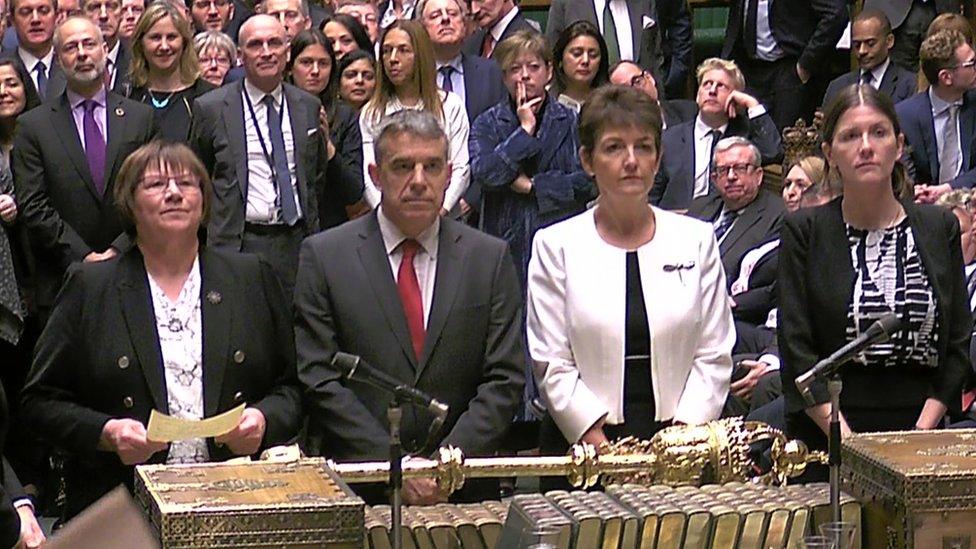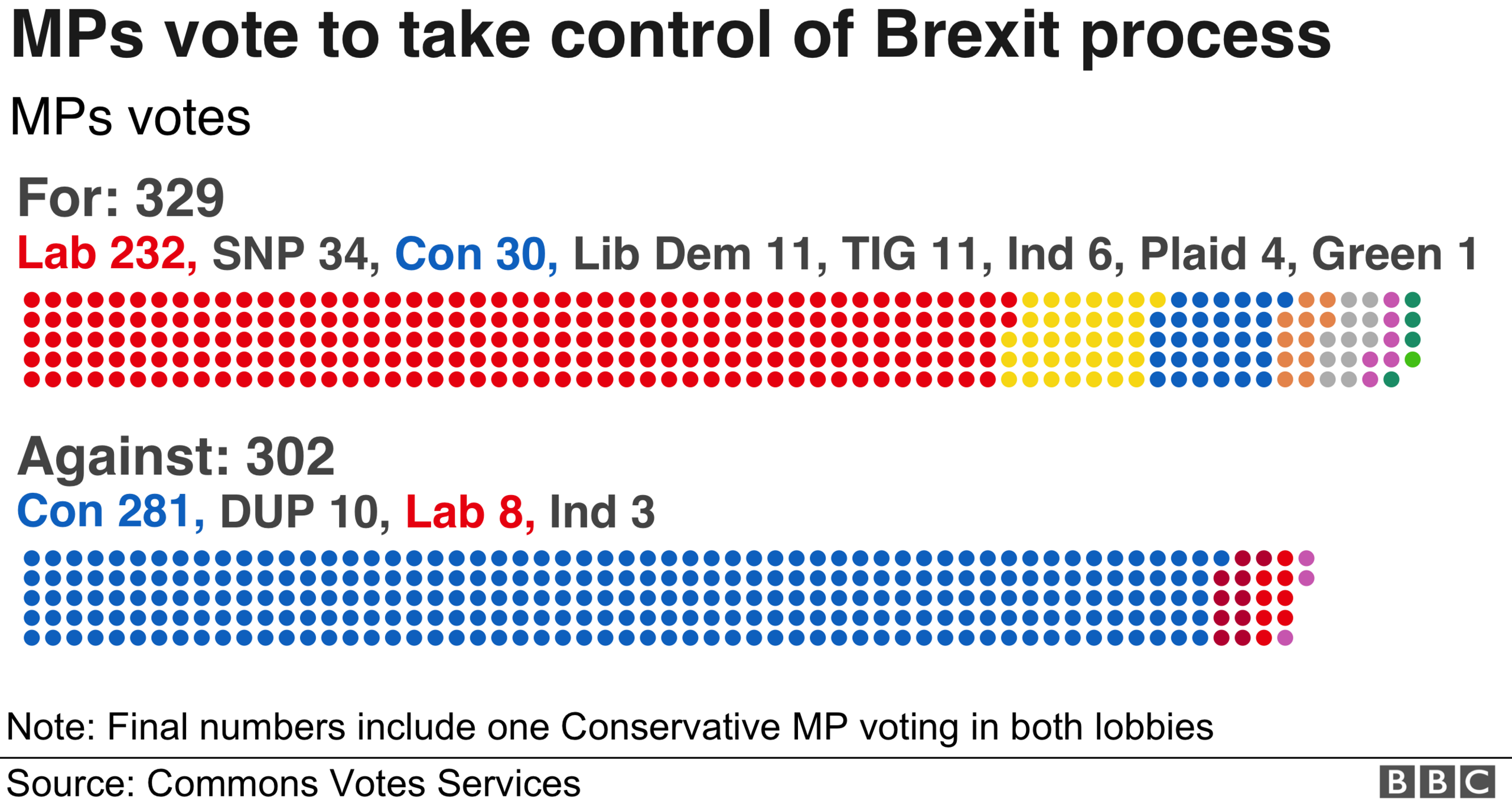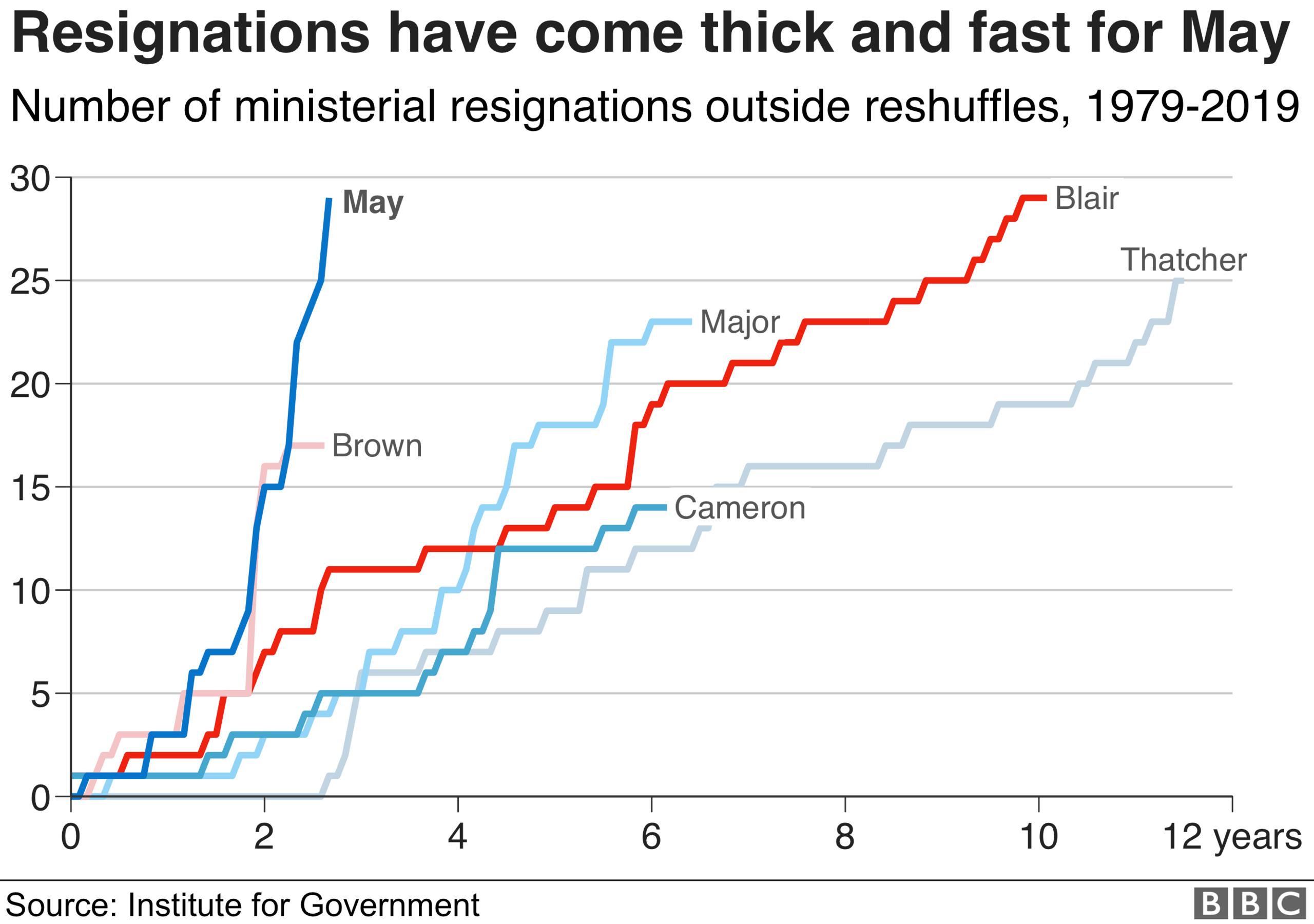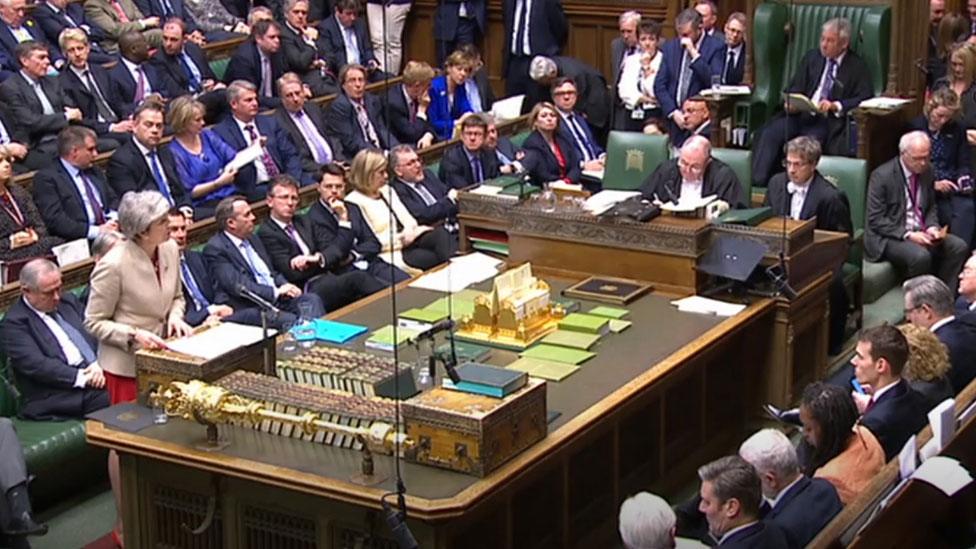Brexit: MPs vote to take control of Brexit process for indicative votes
- Published

MPs have voted to take control of the parliamentary timetable in an unprecedented move to try to find a majority for any Brexit option.
The prime minister was dealt a fresh blow as the government was defeated by 329 votes to 302, setting up votes on Wednesday to find out what kind of Brexit has most support among MPs.
Theresa May has said there is no guarantee she will abide by their wish.
Thirty Tory MPs voted against the government, including three ministers.
Richard Harrington, Alistair Burt and Steve Brine resigned to join the rebels, with Mr Harrington accusing the government of "playing roulette with the lives and livelihoods" of Britons.
Former industry minister Mr Harrington said: "It's absurd that now we are in a position of political impasse and... Parliament hasn't actually talked about it on the floor of the House of Commons. That's what I call a democratic deficit."
Mrs May had tried to head off a defeat by offering MPs a series of votes on Brexit alternatives, organised by the government.
She said allowing MPs to take over the Commons agenda would set an "unwelcome precedent".
But supporters of Conservative backbencher Sir Oliver Letwin's cross-party amendment said they did not trust the government to give MPs a say on the full range of Brexit options.
Labour leader Jeremy Corbyn was among them. He said the government "must take the process seriously".
He added: "The government has failed and this House must, and I believe will, succeed."
He said MPs would want to find a consensus on the way forward, including a possible "confirmatory vote" on the PM's deal by the public - something Mrs May told MPs earlier she did not want because Remain would be on the ballot paper.


MPs involved in the bid on Monday night say if there is a majority for a plan that's not the prime minister's deal then there would be "uproar" if Theresa May tried to ignore it.
It is possible, of course, that Brexiteers who have been resisting the prime minister's deal so far take fright at Parliament having more control of the process, and are more likely to come in line.
That's because, generally, the make-up of MPs are more likely to back a softer deal than the one on offer.
So faced with the choice of Theresa May's compromise this week, or a much longer wrangle to a closer relationship with the EU than the prime minister has negotiated, it is not impossible that the numbers will move in her favour.


How did MPs react?
Shadow Brexit secretary Sir Keir Starmer tweeted: "Another humiliating defeat for a prime minister who has lost complete control of her party, her cabinet and of the Brexit process.
"Parliament has fought back - and now has the chance to decide what happens next."
Hilary Benn said MPs have to take responsibility for the Brexit process because the government is not doing its job.
Mr Benn, chairman of the Commons exiting the European Union committee, told BBC Radio 4's Today programme: "If the government isn't going to do its job then Parliament is going to have to take responsibility, and that is what we are doing on Wednesday."
The SNP's Joanna Cherry said: "It isn't just Wednesday. Now that Parliament has control of the order paper... on Wednesday Parliament could award itself another day and so on and so forth.
"The consensus we are now trying to build is something Theresa May should have reached out to try to build two years ago."
Conservative former Brexit Minister Suella Braverman told the BBC's Newsnight it was "a Parliamentary massacre".
"MPs [in the House of Commons] where we know there is a majority against Brexit, who don't want to respect the referendum, who don't want to honour referendum pledges, are seeking to overturn that and it's unacceptable," she said.
Mr Harrington said in his resignation letter, external that as industry minister, he had been told the government approach was "resulting in cancelled investment decisions, business being placed abroad and a sense of ridicule for British businesses".
The MP said he thought it unlikely the Commons would back revoking Article 50, but another referendum to see "where the public are at" would be "very legitimate".
What happens next?
In a series of so-called indicative votes, MPs will be able to vote on a number of options - likely to include a "softer Brexit", a customs union with the EU and another referendum - designed to test the will of Parliament to see what, if anything, commands a majority.
But the precise format of the votes and how they will work was not set out in the amendment.
And the prime minister said she was "sceptical" about the process - as it was not guaranteed to produce a majority for any one course of action - and she would not commit the government to abiding by the result.
"The votes could lead to an outcome that is un-negotiable with the EU," she told MPs.
Political correspondent Nick Eardley with a Brexit update
Parliament is expected to pass a law this week postponing the Brexit date from 29 March to at least 12 April.
A Department for Exiting the EU spokesman said that when considering Brexit options, MPs should take account of how long negotiating them would take and whether this would require a longer delay and the UK having to take part in European Parliamentary elections.
Those elections are taking place between 23 and 26 May. Both the British government and European Commission believe that if the UK has not exited the EU by the end of May it will be legally required to hold elections.
PM's course unchanged
Mrs May remains committed to winning over MPs to the withdrawal agreement she negotiated with the EU.
She said on Monday it did not have enough support to get through the Commons "as things stand", but she still hoped to persuade enough MPs to back it so she could hold another vote on it this week.
The deal has already been rejected twice by a large margin - and the PM was forced to ask the EU for Brexit to be delayed.
On Monday the government was defeated on its main motion, as amended by Sir Oliver Letwin, by 327 votes to 300, a majority of 27.
The government narrowly defeated a bid by Labour's Dame Margaret Beckett to give MPs a vote on asking for another Brexit extension if a deal has not been approved by 5 April. Dame Margaret's amendment was voted down by 314 to 311, a majority of three.

- Published25 March 2019

- Published25 March 2019
